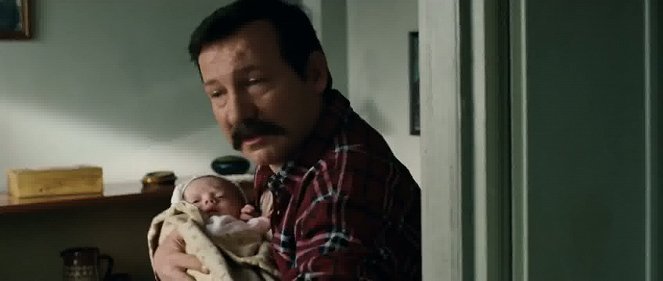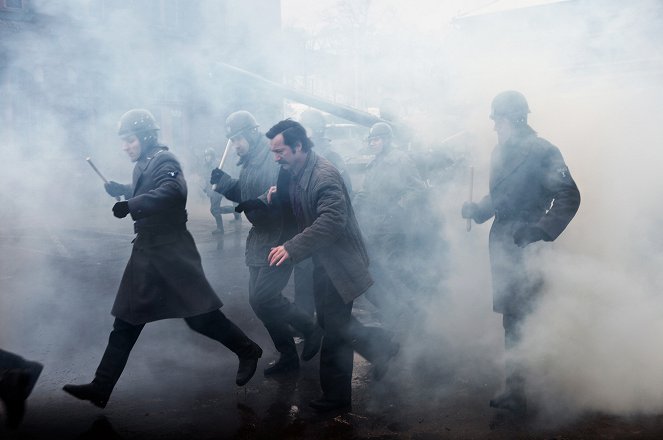Directed by:
Andrzej WajdaScreenplay:
Janusz GłowackiCinematography:
Pawel EdelmanComposer:
Pawel MykietynCast:
Robert Więckiewicz, Agnieszka Grochowska, Zbigniew Zamachowski, Iwona Bielska, Maria Rosaria Omaggio, Miroslaw Baka, Cezary Kosinski, Maciej Stuhr (more)VOD (1)
Plots(1)
How was it possible for a single person to change the world so dramatically? It is as much a political as a psychological question. Wajda, intruding into a private, even intimate sphere of Lech Wałęsa - the Polish "Solidarity" Trade Union's leader, attempts to capture a phenomenon of this incredible metamorphosis: from a simple worker into a charismatic leader. Wałęsa's controversial persona, fostering heated discussions that last till this very day, helped millions of people to release the suppressed dreams of freedom, setting the stage for the political transformations beyond anyone's imagination at the time. And yet, Wałęsa's story does not only have this one psychological or local dimension. The life of a simple electrician, at first fighting for his fellow workers' rights, echoed only some remote events until it was Wałęsa himself and millions of his fellow countrywomen and men that made the world news for several crucial years in the 1980s leading to the fall of the Iron Curtain. (CinEast)
(more)Videos (2)
Reviews (5)
It's certainly good that a film about such a significant figure in modern history exists, and I'm glad I saw it and learned something about Walesa's life. However, it could have been presented in a more accessible format. It felt overly propagandistic to me, and I admit that Lech Walesa didn't really grow on me given his nature. However, the soundtrack certainly deserves praise; it fits perfectly.
()
The Poles may perhaps look at the film with somewhat stricter eyes, as it is their history and they may be able to discover false tones that remained hidden from me as an outsider. However, I can say for myself that I consider the portrayal of Lech Walesa and the events that led to the fall of Polish communism to be convincing. Wajda managed to avoid the pathos that is overused in Polish culture and the idealization of his hero. He also avoided excessive criticism from those who never risked anything and now belittle those who once, under pressure, recanted and collaborated with the secret police. The atmosphere of an angry Poland, tired of eternal inflation and widespread shortages, waiting only for a populist leader to rise to the forefront of the dissatisfied, is impressive. In the film portrayal of Walesa, his character traits like arrogance, authoritarianism, and narcissism are well evident, which later caused him trouble during his presidential era and led to a shameful defeat in the battle against Kwasniewski, but so are his courage, selflessness, and compassion. Simply put, he's not a polished icon, but a flesh-and-blood human being. Overall impression: 85%.
()
The best comedy about real socialism, which has elegance, audacity and a great protagonist. The question is whether, in the case of the biography of one of the iconic (and certainly problematic) characters in the fight against communism, this is necessarily a win, or just a reasonable compromise. As soon as humor disappears from Walesa and it starts "documenting" (the middle strike passage), its considerable dramatic flatness stands out. However, ranked in terms of Eastern European lessons from history, it is above average. [70%]
()
A historical mess that truly makes me wonder what people who only know the basics about Solidarity will take away from it. The problem wouldn't be that the film counts on knowledge of the substance if it didn't try to look educational and make every scene sound so much like a master’s thesis. Don't get me wrong, I actually have quite a bit of respect for the 270-year-old Wajda for coughing up a film so young and dynamic, imbued with unobtrusive humor and Polish underground music, nevertheless, the "workers groan under the regime – strike/protest/wife/strike/police/protest/police/wife/strike – yay freedom" method is almost a testament to the fact that for most Poles the process of the fall of communism was an "I don't even know how it all happened, but we're heroes" experience. Which doesn't sound to me like the brief of most of the film's sponsors (whose parade lasts the entire first two minutes of the film), and that includes Telewizija Polska and Instytut Pamięci Narodowej, who have lately been banging the drum of Polish patriotism and popularizing Polish history with all their boots and might.
()
The story of Poland and its anti-communist hero, Walesa, is quite similar to that of the Czechs, because we lived through the revolution together, when they had Walesa and we had Havel. And similarly, the revolution was made by ordinary people who stood up to the regime. Yet Wajda also knows it's not that simple, and he presents this in his film, though not in a truly striking way.
()



Ads